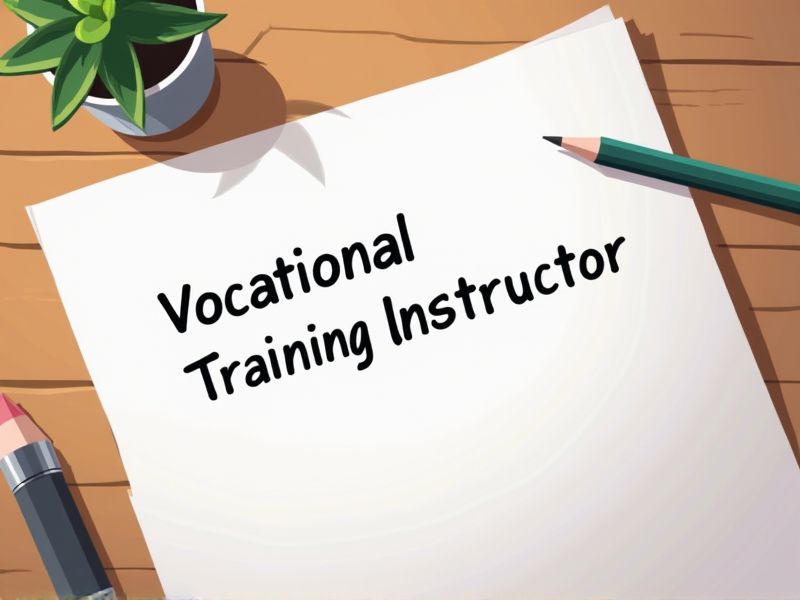
Vocational Training Instructors play a pivotal role in equipping students with practical skills for specific trades, making them key drivers in workforce development. Certifications ensure that instructors possess the technical expertise and pedagogical skills necessary to deliver effective training. Industry-relevant credentials further enhance credibility and align instructors with current standards and practices, vital for student success. Here are some essential certifications you may need as a Vocational Training Instructor.
Certified Technical Trainer (CTT+)
Certified Technical Trainer (CTT+) provides instructors with a standardized set of skills essential for effective teaching in vocational contexts. The certification equips trainers with techniques to convey technical knowledge clearly, ensuring students grasp complex concepts. Employers value CTT+-certified instructors for their proven competency in classroom management and instructional design. As vocational training requires practical and hands-on learning, CTT+ ensures instructors are prepared to deliver content in an engaging and efficient manner.
Certified Vocational Instructor (CVI)
Vocational Training Instructors, with the guidance of a Certified Vocational Instructor, ensure standardized and high-quality education that aligns with industry needs. The CVI credential provides instructors with a framework to incorporate the latest teaching methodologies and technical skills. This certification helps in boosting the credibility of vocational programs, attracting more students and potential partnerships with industries. The presence of a CVI-certified instructor can bridge gaps between theoretical knowledge and practical application effectively, increasing job readiness among trainees.
Adult Education and Training Certificate
An Adult Education and Training Certificate equips a vocational training instructor with essential pedagogical skills, enhancing their ability to effectively communicate complex concepts. It provides a structured understanding of adult learning theories, ensuring that instructional strategies align with adult learners' unique needs. The certificate also reinforces skills in curriculum design and assessment, crucial for maintaining high educational standards in vocational training. As industries evolve, the certificate ensures instructors stay updated with contemporary educational practices and methodologies.
Instructional Design Certification
Instructional design certification equips vocational training instructors with the skills to create structured and effective learning experiences, directly improving student outcomes. The certification provides evidence-based methodologies that enable instructors to tailor their teaching strategies to diverse learning needs. With these enhanced competencies, instructors can develop interactive and engaging training materials that better prepare students for specific trades. This formal recognition also adds credibility, giving both trainers and students confidence in the quality of the training program.
OSHA Safety Certification
OSHA Safety Certification equips vocational training instructors with essential knowledge to minimize workplace hazards, directly enhancing student safety. This certification demonstrates the instructor's commitment to upholding regulatory standards, ensuring compliance with federal safety guidelines. Instructors with OSHA certification can effectively model proper safety protocols, fostering a culture of safety among trainees. Workers trained under certified instructors are statistically proven to have lower rates of workplace accidents, contributing to overall organizational efficiency and safety.
First Aid and CPR Certification
Vocational training instructors often work in environments where physical tasks increase the risk of injuries, necessitating first aid and CPR certification to address emergencies promptly. Certification equips instructors with the skills to manage health crises, potentially reducing the severity of injuries before professional medical help arrives. Instructors with certification can foster a safer learning environment, enhancing student confidence and participation. Certification may fulfill legal or institutional requirements for safety compliance within vocational training settings.
Leadership and Management Certification
Leadership and Management Certification equips vocational training instructors with skills to effectively guide and inspire their students. By gaining these certifications, instructors develop tools to manage educational programs and address challenges in teaching environments efficiently. This training enhances communication abilities, crucial for fostering a collaborative and engaging learning atmosphere. The certification also boosts career advancement opportunities, reflecting a commitment to continuous professional growth.
National Career Readiness Certificate (NCRC)
The NCRC ensures vocational training instructors possess the critical skills employers value, increasing their employability and job effectiveness. By confirming skills in problem-solving, critical thinking, and mathematical reasoning, the certificate aligns instructors' abilities with industry needs. Employers often seek instructors who can directly translate their training into improved workforce capabilities, and the NCRC serves as a standardized measure of such capabilities. The certificate also assists vocational instructors in identifying areas for professional growth, enhancing their teaching methodologies for better student outcomes.
Workforce Development Professional Accreditation
Workforce Development Professional Accreditation ensures vocational training instructors possess up-to-date skills and knowledge aligned with industry standards, enhancing the quality of education provided. Accreditation establishes a standardized benchmark, promoting consistency across vocational programs and increasing trust among employers regarding graduates' competencies. It elevates an instructor's credibility, often translating into increased employment opportunities and career advancement potential. Accreditation drives continuous professional growth, encouraging instructors to engage in lifelong learning and adapt to evolving workforce demands.
TESOL Certification
TESOL Certification equips vocational training instructors with the necessary skills to effectively teach English language learners, ensuring clear communication. It fosters a better understanding of cultural diversity, enabling instructors to create an inclusive learning environment. The certification enhances instructional techniques, allowing for tailored approaches that meet individual student's language proficiency levels. Employers increasingly value TESOL credentials, often making them a requirement for positions involving language instruction in vocational settings.
Summary
When you pursue certifications as a Vocational Training Instructor, you can enhance your teaching skills and credibility. Possessing recognized credentials often leads to increased employment opportunities and potentially higher salaries. Employers may perceive you as more competent and committed to professional development. This could result in improved student outcomes due to more effective instruction techniques.
